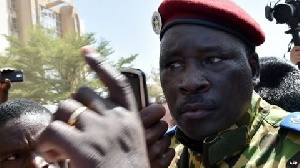Burkina Faso's political parties have agreed that the country's political transition should last a year, followed by elections in November 2015.
But the crisis talks in the capital Ouagadougou ended without a deal on who would head a transitional government.
The military has been in charge since President Blaise Compaore was forced to quit last week amid mass protests.
The African Union (AU) on Monday gave the military two weeks to hand power to a civilian ruler or face sanctions.
Lt Col Isaac Zida - the interim leader backed by the army - later promised to comply with the deadline. He was previously second in command of the presidential guard.
'Chaos'
Wednesday's crisis talks in Ouagadougou were also attended by civil society groups and tribal chiefs, according to a statement issued after the meeting.
The presidents of Ghana, Nigeria and Senegal mediated the talks.
The statement added that all parties in the negotiations wanted an "eminent civilian personality" to head the transition, without providing further details.
At one stage, the meeting descended into chaos as opposition politicians stormed out.
"We do not want to talk with the old governing party. They represent Blaise Compaore," Rose-Marie Compaore, parliamentary leader of the main opposition group, was quoted as saying by the AFP news agency.
But the opposition was later persuaded to return to the negotiating table.
'Welcome to stay'
The AU sanctions could include suspension of Burkina Faso's AU membership and a travel ban on military officials. The AU's Peace and Security Council is expected to meet again later this month to discuss the crisis.
Under Burkina Faso's constitution, the head of the National Assembly should take office if the president resigns.
Mr Compaore first seized power in a coup in 1987, and thereafter won four disputed elections.
The protests were triggered by his plan to amend the constitution so that he could run for office again in elections next year.
Mr Compaore was forced to flee to neighbouring Ivory Coast and is currently staying in the capital Yamoussoukro.
France - the former colonial power - has admitted helping in the evacuation of Mr Compaore.
Ivorian leader Alassane Ouattara has said Mr Compaore is welcome to stay as he helped bring peace to Ivory Coast during unrest following elections in 2010.
General News of Thursday, 6 November 2014
Source: BBC













